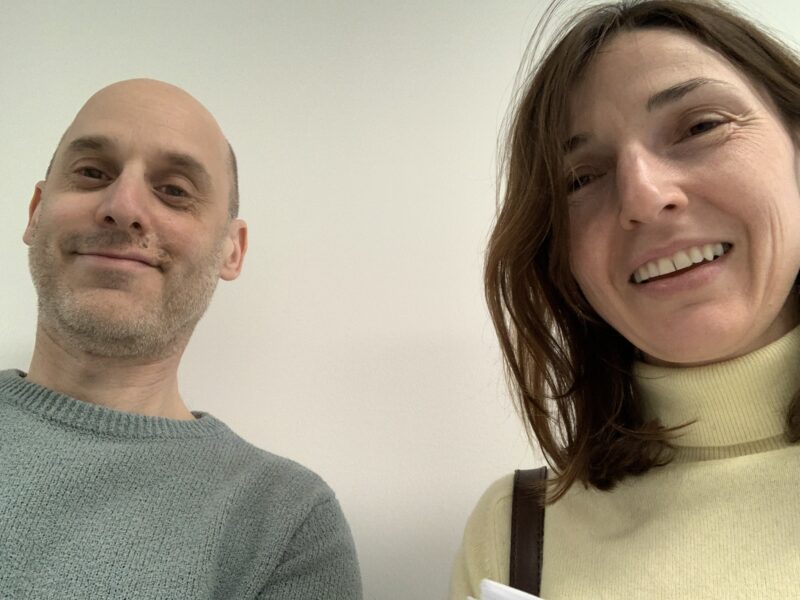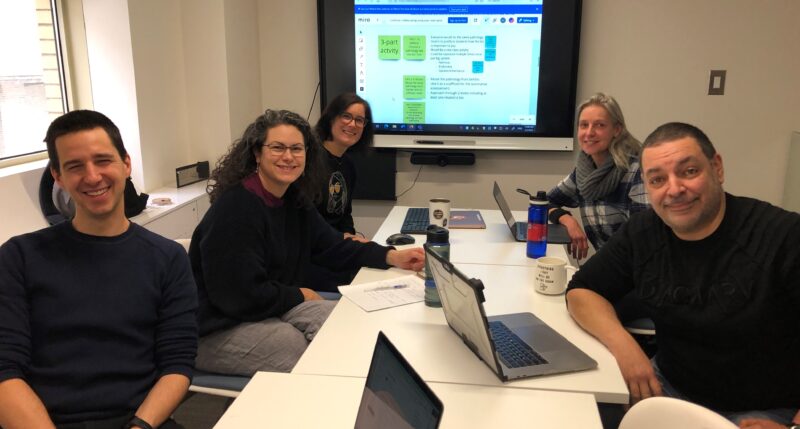Learning Communities Project Development Winter 2023
Three new projects in Social Science, Science and General Education are in full design mode this winter in the Learning Communities project. The project teams meet weekly or biweekly, supported by LC sector leads and guided by Dawson’s homegrown LC Design Toolkit.
These interdisciplinary teams are creating some truly exciting curriculum design innovations, to the future benefit of Dawson programs and students. In the first phase of the design process, the teams refine a lay out the project objectives and curricular format in a project abstract; address the logistical challenges posed by team teaching; and assess some of the core practices associated with learning community pedagogy. In the second phase, which stretches through the end of March, the teams zoom in on the nitty-gritty of interdisciplinary course design: Integrative learning outcomes, learning activities and assessments, and aligned course schedules. Watch for another update by the end of term on these final outputs.
For more information on each W23 project, browse the project abstracts below. Have questions about Learning Communities or ideas for a new project? Don’t hesitate to contact LC coordinator Ian MacKenzie.
Vertical integration of Behavioural Biology and Biological Psychology in the Psychology Profile
- Stephane Gaskin (Psychology), Gina Gentile (Biology), Sylvia Cox (Psychology), Jean-François Brière and Annie-Hélène Samson (LC leads) – see featured image above.
Behaviour is the product of multiple interactions between biological, psychological, social, and environmental factors. This project will increase student awareness of these fundamental connections by: 1. Aligning curriculum and creating shared activities between Behavioural Biology and Intro to Psychology (will run concurrently for Psych profile students) and 2. Creating activities to establish continuity and strong links between Behavioural Biology and Biological Psychology (taken the following semester by some Psych profile students). Our focus will be on Psych profile students as they make up the majority of students taking these three courses. However, non-Psych profile students must be considered as some will take one of these three courses independently of the others. Activities will help students become aware of how different levels of analysis are involved in understanding behaviour (i.e., molecular, cellular, system, cognitive and social). In addition, students will gain a biological perspective of each topic by focusing on anatomy, genetic inheritance and physiological mechanisms such as those regulating homeostasis. They will also acquire a psychological perspective of the same topic by also focusing on memory, emotions, motivation, consciousness, mental illness, and social behaviour. An activity framework will be created that can be reused with different topics and be accessible to all teachers in the biology and psychology departments to ensure longevity of this collaboration.
Power and Place: Three-course cluster (Geography, Sociology, Introduction to Social Science Research) for first-term Social Change and Solidarity Profile
- Sara Louise Kendall (Geography), Kelly Phipps (Sociology), Lisa Steffen (LC lead)
Positioned in the first semester for students in the Social Change & Solidarity profile, our course cluster will explore the theme of “Power and Place.” The Individual and Society Sociology course provides students with the foundational tools to examine social inequality, as students learn to see and name social identities (race, gender, sexuality, class, etc.) and structures of oppression (colonialism, capitalism, heteropatriarchy, etc.). The Introduction to Geography course will support students in applying these theories to real-world case studies, as we consider how these concepts might help us to understand, for example, gentrification in the neighbourhood around Dawson College, the disproportionate impacts of climate change on Pacific Island nations, and the connections between local and global movements for social justice. The Introduction to Social Science Research course will support students to develop practical and hands-on skills directly connected to this learning, while also reflecting on how our social and geographical locations – power and place – might shape our research, too. Combining theoretical and hands-on learning about contemporary issues, students will leave this LC with core critical lenses for examining (and re-imagining!) power and inequality in their lives and in the world around them.

Voices across Contemporary Quebecois Literature / Voix croisées dans la littérature Québécoise contemporaine
- Jeffrey Gandell (English), Carmen-Silvia Cristea (French), Patricia Romano (LC lead)
These common-time-block courses aim to introduce students to contemporary Quebecois literature from the point of view of our “two solitudes”: anglophone and francophone. Each course will examine independently—and in collaboration with the other—English and French texts currently being published here. We’ll aim to tackle some big questions: What does it mean to be Quebecois(e)? Is there such a thing as a Quebecois literature that crosses the linguistic divide? How might looking at the Quebecois experience from these multiple perspectives blur the lines between categories like “anglophone,” “francophone,” “immigrant,” etc. Our common time block will allow for multiple shared in-class activities: roundtables, debates, conferences, and cultural activities. We’ll also collaborate on a shared virtual space: a blog where ideas can be exchanged in real-time or asynchronously. The final project will be an online publication featuring a collection of collaborative theoretical and creative work.



